In this volume, progressive experts survey recent trends in qualitative study, which relies on small sample groups and interview data to better represent the context and complexity of social work practice. Chapters address different approaches to qualitative inquiry, applications to essential areas of research and practice, integration of qualitative and quantitative methods, and epistemological issues.
This second edition brings even greater depth and relevance to social work qualitative research, including new material that tackles traditional research concerns, such as data quality, ethics, and epistemological stances, and updated techniques in data collection and analysis. To increase the usefulness for students and researchers, the editors have reorganized the text to present basic principles first and then their applications, and they have increased their focus on ethics, values, and theory. New and revised illustrative studies highlight more than ever the connection between effective research and improved social functioning among individuals and groups. The collection continues to feature scholars and practitioners who have shaped the social work research practice canon for more than twenty years, while also adding the innovative work of up-and-coming talent.
Tabla de materias
Preface
Part I The Big Picture
1. Standards for Qualitative Studies and Reports, by James W. Drisko
2. Ethics in Qualitative Research, by Frederick Reamer
3. Deconstructing the Epistemological Question with a Focus on the Knower, by Robert L. Miller Jr.
Part II. Approaches to Qualitative Research
4. Constructivist Research in Social Work, by James W. Drisko
5. Grounded Theory, by Jane F. Gilgun
6. Ethnography, by Roberta G. Sands
7. Analysis of Personal Narratives, by Catherine Kohler Reissman
8. ‘We have a situation here!’: Using Situation Analysis for Health and Social Research, by Lesley Green Rennis
9. Action Research: An Intervention for Change, by Shirley J. Jones
Part III: Methods of Data Collection and Analysis
10. Qualitative Interviewing, by Judy L. Postmus
11. Focus Groups, by Raymie Wayne
12. Qualitative Data Analysis Software: An Overview and New Possibilities
Part IV: Qualitative Program Evaluation
13 Qualitative Program Evaluation: Overview
14. Program Evaluation: Departures
15. The Application of Qualitative Research to Organizational Decision-Making
Part V: Generating New Knowledge for Social Work
16. Coping with the Dual Demands of Psychiatric Disability and Parenting: The Parents’ Perspective
17. Assessing Young Children’s Perceptions of Family Relationships: Theory and Applications of the Narrative Story-Stem Technique, by Tim Page
18. Parenting and Child Neglect among Families in Urban Poverty: A Qualitative Approach
19. Doing the Best You Can? The Relationship between Caseworker and Parent: A Case Study
20. Scholarships and Support Available to Foster Youth: A Qualitative Approach to Understanding Service Delivery
21. Collaboration between Social Workers and Physicians: Development and Application of a Typology
Appendix
Sobre el autor
Anne E. Fortune is professor and associate dean for academic affairs at the School of Social Welfare, University at Albany, State University of New York. She is the editor of Task-Centered Practice with Families and Groups, coeditor of Social Work Practice Research for the Twenty-first Century, and coauthor of Research in Social Work. She is past editor of The Journal of Social Work Education and of Social Work Research. William J. Reid (1928–2003) was a professor at the School of Social Welfare, University at Albany, State University of New York, and founding editor of the National Association of Social Workers Press journal Social Work Research. He received the NASW Presidential Award for Excellence in Research and the Distinguished Achievement Award from the Society for Social Work and Research.Robert L. Miller is an associate professor at the School of Social Welfare, University at Albany, State University of New York. He explores the intersection of social work and public health, focusing on health disparities and structural inequalities related to health outcomes among African Americans.












